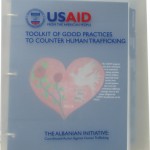
A toolkit developed under USAID’s Coordinated Action Against Human Trafficking (CAAHT) project promises to help local partners continue the struggle against trafficking in human beings.
The Albania Initiative: Coordinated Action Against Human Trafficking’s fifth and final conference on September 16th unveiled the Toolkit of Good Practices to Counter Human Trafficking. It was delivered to more than 350 government and civil society anti-trafficking actors from around the nation, capturing key lessons from the project. “The challenge remains today, and becomes even more critical… While the program will end, traffickers will not voluntarily abandon their criminal behaviors,” said USAID/Albania Mission Director, Roberta Mahoney.
The Toolkit highlights the many activities conducted by civil society organizations across Albania supported with USAID grant funds. The Toolkit includes a 25-minute video and written materials that present proven techniques and methodologies from the project. “[The Toolkit] is a clear guide for the daily work and continuing activities carried out by the anti-trafficking community,” said Arian Çala, Executive Director of Another Vision, a longtime CAAHT partner.
More than 2,100 government and 210 civil society actors were trained in anti-trafficking and management skills through conferences, technical training workshops and capacity building by CAAHT staff for local partners.
“The Toolkit captures good principles and broad strokes of good ideas,” said Sarah Stephens, Creative Associates’ Chief of Party for the project during its six years of implementation. “ Stephens underscored the need for continued engagement by Albanians, saying “Despite an elaborated national anti-trafficking strategy, much of it remains on paper. There is insufficient political and administrative will to encourage government employees to recognize their responsibilities as outlined in the national anti-trafficking strategies. Government entities have yet to ensure adequate budgeting for activities. This is where the fragility remains at the close of the program,” said Stephens.
For more information about CAAHT,
visit www.caaht.com